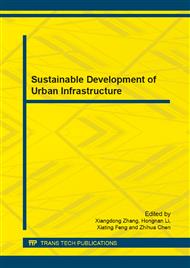p.1098
p.1102
p.1107
p.1114
p.1121
p.1130
p.1135
p.1139
p.1147
Prospective Prognosis of Beijing Urban Transportation Energy Consumption and Carbon Emission
Abstract:
In order to achieve the goal of low-carbon development of the Beijing transportation, the changing trend of the transportation energy consumption and carbon emission is analyzed based on the inertia development of the present situation or under different macroscopic regulations so as to provide theoretical reference for transportation department to formulate development strategies effectively. According to the characteristics of the Beijing urban transportation system, first a energy consumption and carbon emission calculation model for urban road traffic and urban rail transit was established separately. Then the inertia-based prediction model of Beijing urban transportation energy consumption and carbon emission was established, by analyzing the development law of the related basic parameters using regression and other methods. According to the current policies, the development and prediction of part of the parameters were limited, and a scenario forecast model has been thus established (suitable up to 2020). Four types of scenario prediction examples under different policies were presented, and the contribution rate of each policy for carbon emission was analyzed.
Info:
Periodical:
Pages:
1121-1129
Citation:
Online since:
December 2012
Authors:
Price:
Сopyright:
© 2013 Trans Tech Publications Ltd. All Rights Reserved
Share:
Citation:


